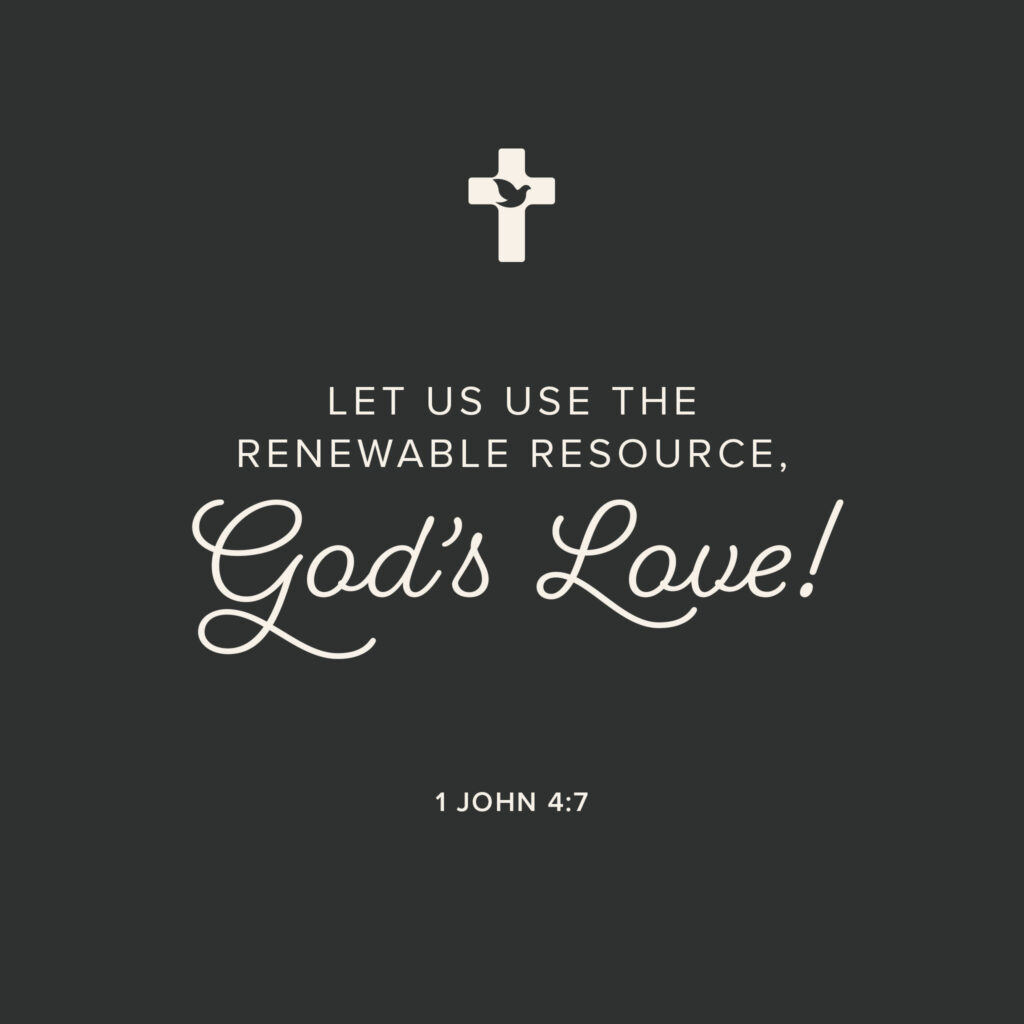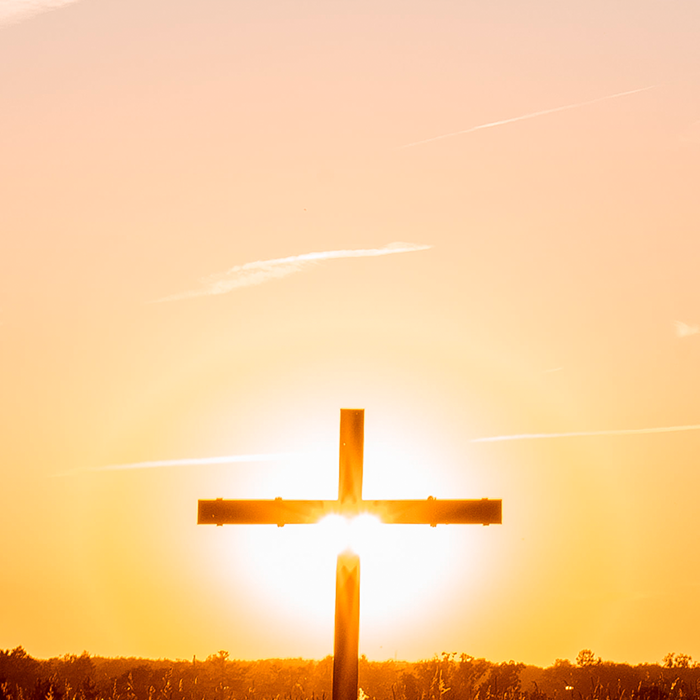May 5, 2024
Pastor Gunnar Ledermann
1 John 4:7-11,19-21
1 John 4:7-11,19-21
7 Dear friends, let us love one another, for love comes from God. Everyone who loves has been born of God and knows God. 8 Whoever does not love does not know God, because God is love. 9 This is how God showed his love among us: He sent his one and only Son into the world that we might live through him. 10 This is love: not that we loved God, but that he loved us and sent his Son as an atoning sacrifice for our sins. 11 Dear friends, since God so loved us, we also ought to love one another.
19 We love because he first loved us. 20 Whoever claims to love God yet hates a brother or sister is a liar. For whoever does not love their brother and sister, whom they have seen, cannot love God, whom they have not seen. 21 And he has given us this command: Anyone who loves God must also love their brother and sister.
“Separate the recycling from the trash,” has become a common phrase along with the search for renewable materials and systems. Caring for the resources God has given us rather than wasting them is a way to show God love for all he has given us. The search for renewables will continue, but there is one renewable resource already in our possession, God’s love. God’s love is endless. Unfortunately, we often do not use the endless love of God turning instead to hate for one another. God’s love overcame our hate and many other sins through Jesus’ atoning sacrifice on the cross. Loved and forgiven, let us love one another.
“You are wasting it.” These words might be said of a young person who continues to pour out milk into an already overflowing glass. Or this phrase might be thought when driving by a home with the sprinkler system running after a major rainstorm. And these words might be said of someone who uses their many freedoms and opportunities in this country for selfish, lazy, perverse and unproductive behavior. This phrase would not have been used to describe Tabitha, who we hear about in our Old Testament reading. God filled her with his love, and she put it to use as we read in Acts 9,
36 In Joppa there was a disciple named Tabitha (in Greek her name is Dorcas); she was always doing good and helping the poor. 37 About that time she became sick and died, and her body was washed and placed in an upstairs room.
Tabitha’s death filled her brothers and sisters in Christ with sadness. Then they heard Peter was near, so they sent for him. When he arrived, God allowed him to bring Tabitha back to life. Through a miracle God’s love for Tabitha, the love she shared and the love others had for her was renewed.
Unlike love, hate trashes our lives. Hate may spread, but it is not renewable. Hate removes things that are good like a person’s reputation or safety causing things like abuse, neglect and injury. In our New Testament reading from 1 John 4, John exposes the depth of hate’s emptiness,
20 Whoever claims to love God yet hates a brother or sister is a liar. For whoever does not love their brother and sister, whom they have seen, cannot love God, whom they have not seen.
John makes a clear point that someone who claims to love God yet hates another person is not just lying, but a liar. John is not describing a person’s actions, but the person’s character. Growing comfortable in thinking and saying that we love God, while also thinking and saying hateful things about another person makes us hypocrites. John exposes our hypocrisy even more with the rationale that a person cannot hate someone they have seen, while loving God whom they have not seen. When we hate others, our faith suffers. When we set the conditions for who we hate and who we love, our hypocrisy becomes a barrier between ourselves and God. If not taken out of our hearts, hate will rob us of our faith.
God’s love for you, has saved you. Hate along with all your sins was taken out through Jesus. In our Gospel reading from John 15, Jesus said, 13 Greater love has no one than this: to lay down one’s life for one’s friends. These were not just nice thoughts and words Jesus spoke to his disciples as if throwing out some philosophical teaching into the universe to be compared with other definitions of love to see what lasts through the ages or what works for certain individuals. No, these words were short lived prophecy as Jesus the next day laid down his life on the cross. These words are the reality of God’s love for you as we heard in our New Testament reading from 1 John 4,
9 This is how God showed his love among us: He sent his one and only Son into the world that we might live through him. 10 This is love: not that we loved God, but that he loved us and sent his Son as an atoning sacrifice for our sins.
There is no condition to God’s love for you. God loves you and he loved you by taking your sins of hate, conditional treatment of others, using up and throwing out of good things and all your other sins, and pouring out his hatred of them for their loveless nature on his own Son. Jesus sacrificed himself for our sins. So, through Jesus, you have life. You have been saved from your sins because God loved you. The proof of God’s love is the cross, empty tomb and resurrected Jesus. When your lack of love fills you with fear that God might not love you, Jesus resurrected stands as the source of infinite unending life. God fully funded with Jesus’ blood and perfectly planned through prophecy his love in actions to save you.
The renewable resource is God’s love. There is no limit to the amount of God’s love that can be shared. With confidence in God’s love, John encourages us to love continuously in 1 John 4, 7 Dear friends, let us love one another, for love comes from God. Everyone who loves has been born of God and knows God. God gave us life and we know him through what he has given us. Not only has God given us our physical lives, the world to keep us alive and the ability and senses to enjoy this world, but he has also given us love for Jesus. Faith, hope, trust and love all describe our relationship with God. And his love is unlike this world that has been corrupted by sin, so that death, decay, limits and ends define it. Instead, his love spreads, grows, multiplies and lives. So, John writes, 11 Dear friends (literally ‘beloved’ in the Greek), since God so loved us, we also ought to love one another. Then, John writes, 19 We love because he first loved us. And again, he writes, 21 And he has given us this command: Anyone who loves God must also love their brother and sister. God has loved us to save us, and to renew us as creatures of love for him and one another.
God loves us, while we struggle to love. We know God, so we want to love. We do not want to submit to hateful thoughts, words and actions. We know what John writes in 1 John 4, 8 Whoever does not love does not know God, because God is love. In this verse, John is not describing God’s actions, but his character. God’s character is love, which is why John wrote in the verse before, 7 Dear friends, let us love one another, for love comes from God. We know God, so we know love. And now let us speak plainly about what love, unconditional love, looks like. We know how to love someone else based on how God shows love to us. He shows us our sins and he shows us our Savior. God threatens judgment for our sins calling us to repentance, and he gives us forgiveness through Jesus. So, we love others by observing their words and actions to know whether to share the law or the gospel. Although it can be perceived as unloving or hateful, sometimes we must show someone their sin and to the unrepentant withhold pronouncing God’s forgiveness. This is not done in judgment, for only God can judge, but in love and with prayer that the person will repent and turn to Jesus. On the other hand, we might be the only one in a person’s life who tells them that they are loved and forgiven by Jesus when the rest of the world would write such a person off as too horrible, evil, broken, etc. God’s love is the renewable resource for use in all situations because there is always more of it 8 … “because God is love.”
We separate the recycling from the trash. Caring for the resources God has given us shows God love for all he has given us. The search for renewables continues, but there is one renewable resource we already have, God’s love. Unlike love, hate trashes our lives, but God’s love overcame our hate and many other sins through Jesus’ atoning sacrifice on the cross. The infinite, unending, fully funded and perfectly planned love of God saved us. Let us use the renewable resource, God’s love. Amen.




